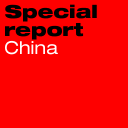 |
|
| ||||||||||||||||||||||||||||||||||||||||||||||||||||||||||||||||||||||||||||||||||||||||||||||||||||||||||||||||||||||||||||||||
 |
|
| ||||||||||||||||||||||||||||||||||||||||||||||||||||||||||||||||||||||||||||||||||||||||||||||||||||||||||||||||||||||||||||||||

|
Mao returns to haunt and comfort
his people Thousands gather to wish former leader happy birthday Jonathan Watts in Shaoshan, China Saturday December 27, 2003 The Guardian The cult of Mao Zedong re-emerged with a bang and a flash yesterday as tens of thousands of worshippers paid homage in the "great helmsman's" hometown to mark the 110th anniversary of his birth. In a remarkable display of idolatry for an atheist nation, visitors burned incense and lit bonfires of offerings before bowing deeply before a huge golden statue of the former party chairman, whose presence is growing stronger nearly 28 years after his death. From midnight to early afternoon, revellers set off tonnes of deafening firecrackers and fireworks in a spontaneous festival to celebrate Mao's birth. Most appeared to treat the event as an excuse to party, but a handful displayed religious fervour by throwing themselves repeatedly to the ground before his statue. "I worship Mao as a god," said an elderly man called Mr Tong. "He didn't just found our nation. He established our system of morality." Outside Shaoshan, in central Hunan province, few people are likely to hear such comments or witness such semi-religious rituals because this is not the image of modern China that Beijing wants to project. Television crews were noticeable by their absence. Instead, political leaders chose to stay indoors and mark the day with speeches and banquets. China is meant to have left Mao worship behind. For the government, it is a disturbing reminder of the insanity of the 1966-76 cultural revolution, when student "red guards" wreaked havoc in the name of the leader they worshipped. For the country's rising urban middle class, the period is an embarrassment. If Shaoshan is a barometer, then feelings towards Mao have gone through three main waves. During the cultural revolution, this hilly town thronged with red guards who were bussed here on state-sponsored pilgrimages. During the 1980s, when Mao's failings as a leader became more widely known, it suffered a downturn as he was quietly ignored. In the past 10 years, local officials say annual visitors have almost tripled to 2 million as a more affluent population search for their own version of Mao. Local businesses are cashing in. Rows of Mao souvenir stalls offer tourists a dizzying array of memorabilia - garish clocks, numerous statues, badges and pens. Restaurants vye for business by promising the most genuine "Mao pork" - the fatty dish loved by the leader. Entrepreneurs have even leased a local graveyard containing Mao's relatives to develop it as a tourist attraction. The hunger for Mao kitsch extends across much of China. His pudgy features peer from banknotes and stamps, classroom and restaurant walls. But the big difference from the cultural revolution is that people are free to choose whether - and how - they want to display his portrait. This has fostered not just one modern Mao, but several: the demigod whose giant portrait hangs in Tiananmen Square; the revolutionary hero whose liberation of China is celebrated in films; and the lecherous old leader responsible for millions of deaths. But for many he remains a figure with supernatural powers. In remote areas, childless couples are said to pray to him for children. Even in Beijing, many drivers keep a Mao pendant dangling from their rearview mirrors as a lucky charm. Wang Wenhai, an artist and devotee of Mao, tries to reflect these different faces in the 1,500 sculptures he has made of the chairman. Until recently he produced only the classical images of Mao permitted during the cultural revolution, but in the past year he has made a Mao buddha, a gay Mao, a lady Mao and a Mao pillow for those who want to sleep with the chairman. "I just want people to adore him like I do," he said. "During the cultural revolution that meant reproducing the standard Mao figure. But these days that doesn't appeal so I want to find different ways for different people to love him." Mao in a dress is hardly the image that the government encourages, but the authorities have also tried to update perceptions of modern China's founder to be more in keeping with a country that is increasingly globalised and money-orientated. To mark the 110th anniversary, a short rap song has been released with lyrics from Mao's speeches. State publishers have printed a series of "Learn from Mao" books, including one containing business management tips from the communist revolutionary. Mao, it seems, can be everything to everyone, though social commentators say his cultural significance is becoming more shalloweven as his image grows more ubiquitous. "Money has replaced Mao as the most important thing in people's lives," said Li Xianting, an art critic. "Mao now plays the role of kitchen god - a superstitious rather than a religious object. People don't really believe in it, but they still keep it around the home out of habit." Even at Shaoshan, several stalls have buddhist images beside those of Mao. One pair of clocks on display has exactly the same design and technology but a different object of worship. Compared to the closed "Mao and China" mentality of the cultural revolution, there is also a very evident willingness to consider outside ideas and foreign cultures. The only two non-Chinese people in Shaoshan yesterday were welcomed everywhere with the not-very-Maoist greeting, "Happy Christmas". Special reports China Archived articles More on China World news guide China Useful links Chinese government gateway site Human rights in China China Daily South China Morning Post China Times Printable version | Send it to a friend | Save story | |||||||||||
 |
 |